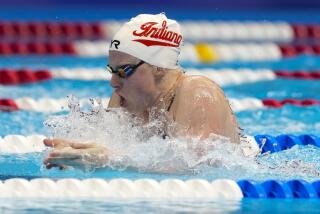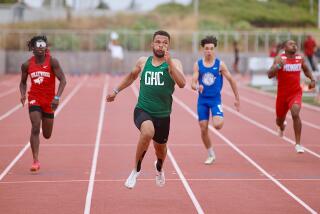Back in the Swim : UC Irvine’s Brian Pajer Reaches NCAA Championships While Battling Asthma
- Share via
If only for a moment, it seems that Brian Pajer’s roller-coaster swimming career has reached another high point.
A sophomore at UC Irvine, Pajer holds school records in the 100- and 200-yard breaststroke and two Pacific Coast Athletic Assn. championship titles in each event, and he is competing for the second time in the NCAA Division I swimming championships, which started Thursday at the University of Texas in Austin.
That’s quite a ride for someone whose asthmatic condition keeps him moving in and out of the training room.
Pajer, 19, thought he had given up competitive swimming for good at 15 while training with the Mission Viejo Nadadores.
“I’d go to the workouts, get in the water, and I just couldn’t breathe,” he said. “It was really frustrating that I always had the strength, I knew I had the ability and everything, and I just couldn’t do it because my lungs wouldn’t let me.”
Sometimes they did. Pajer had more than 40 first places in age-group swim meets by the time he started swimming with the Nadadores in 1981.
His time of 1 minute 2.73 seconds in the 100-yard breaststroke at the 1982 Orange County age-group swim championships set a meet record in the 13-14 division.
His victories came between periods of illness that lasted sometimes only a few days and sometimes months. Although he was never hospitalized, Pajer didn’t swim his entire seventh-grade year because of asthma.
“I’d just swim when I could, and when I couldn’t, I’d take time off,” he said. “But I always had a talent for the breaststroke. I could get in the water after taking two months off and swim a good breaststroke race.”
After two months, maybe. But he spent 2 1/2 years out of the pool as a student at Mission Viejo High School before he joined the Saddleback Aquatics swim club in March 1985.
Pajer planned to enroll at UC Irvine the next fall, although he did not intend to try out for the swim team. But Matt Wright, a former teammate on the Nadadores who was going to compete at UCI, arranged a meeting between Pajer and UCI Coach Charlie Schober that spring.
By summer, Schober had offered Pajer, who was still swimming for the Aquatics, a spot on the team.
“At that point, he was just an average (college-level) swimmer, and I wasn’t even sure he’d make our traveling squad,” Schober said.
Pajer’s best time of 1:01 in the 100-yard breaststroke with the Aquatics as a high school senior was about three seconds off Schober’s traveling squad standards.
Even so, almost as soon as he started working out with the Anteaters as a freshman, Pajer began asking Schober what it would take to qualify for the NCAA championships.
Schober found Pajer’s questions amusing, considering that Pajer’s best time in the 100 breaststroke was nearly five seconds slower than the qualifying standard for the NCAA championships.
“To make the drop that he needed to make to make it, you think along the lines of maybe in four years or something,” Schober said.
Said Pajer: “I never told anyone (other than Schober) I was going for it because it would seem stupid. I knew I would sound like an idiot. ‘Yeah, I’m a 1:01 breaststroker, but I’m going for the NCAAs.’ People would laugh.”
It didn’t seem that silly to Pajer. He had improved by seven seconds in the 100-yard breaststroke during one eight-month training period with the Nadadores.
And after a few months of workouts, it didn’t seem quite as silly to Schober, either.
“He just kept improving through the season, so he kind of grew into it as he went along,” Schober said. “As we got close to the last few dual meets, it started to be pretty realistic.”
Pajer entered the PCAA championships last spring after having lost only one race during the regular season, but his best time was still two seconds off the NCAA qualifying time of 56.33 seconds.
“I thought I had a really good chance to qualify, but nobody else seemed to think I had a chance,” Pajer said. “Nobody.”
Pajer surprised them all. He swam a personal best 56:30 in the preliminary round to qualify for the NCAAs.
Pajer won the PCAA 100-yard breaststroke in 56.87 seconds and the 200 in 2:03.65.
He went on to finish 17th in the 100 and 28th in the 200 in the NCAA meet.
This season, it was Pajer who doubted his chances of qualifying. He had injured a thigh in November and a knee in December, which forced him to eliminate breaststroking from his workouts for five weeks. He also suffered more from his sporadic asthma attacks this season, though he never missed workouts for more than a few days at a time.
These setbacks left him one month of uninterrupted training before the PCAA championships Feb. 26-28. He was close but still hadn’t achieved a time that would qualify him for the NCAA championships when he stepped on the blocks for the preliminary round.
“When I went into the conference (championships), I wasn’t feeling good,” he said. “I didn’t have any confidence.”
Pajer was .67 of a second off the NCAA standard after the preliminaries entering the final.
“I was swimming scared,” he said of the final. “I was swimming for my life.”
He made the time. His 56.11 took first place and qualified him for the NCAAs. He was named PCAA swimmer of the year, along with two other swimmers.
Pajer also finished first in the PCAA 200-yard breaststroke in 2:03.
All of which is quite satisfying for Pajer . . . for the moment.
“I’m going to have to drop two seconds off my 100-meter time to make the Olympics from what I can see now of the competition,” he said. “Yeah, I think I can take two seconds off this year. . . . It’s not like saying, ‘Well, you know, I want to go a 1:03 and I’m at a 1:10’ or something.”
And it seems he’s said something like that before.
More to Read
Get our high school sports newsletter
Prep Rally is devoted to the SoCal high school sports experience, bringing you scores, stories and a behind-the-scenes look at what makes prep sports so popular.
You may occasionally receive promotional content from the Los Angeles Times.






